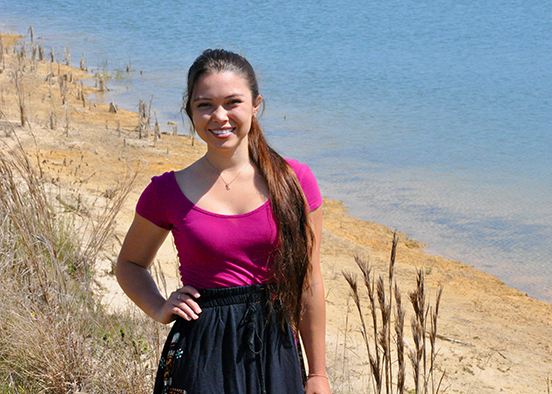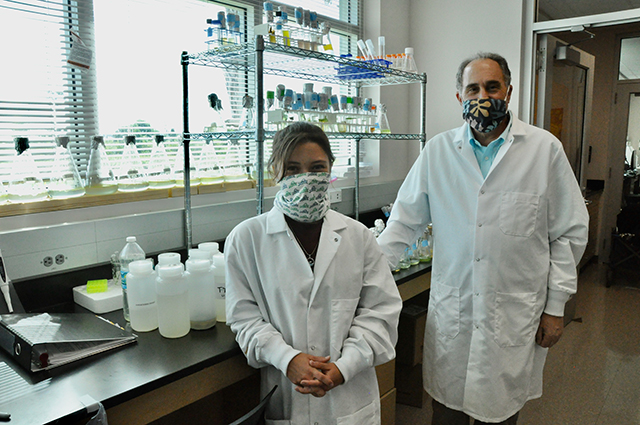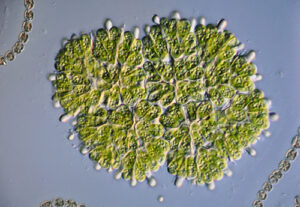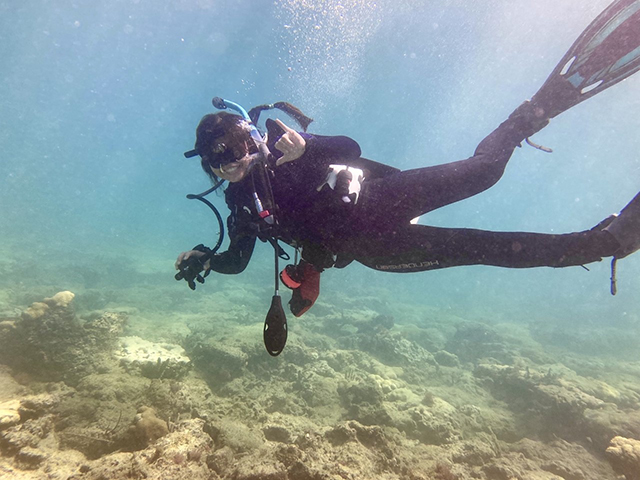Growing up in Gainesville and gliding through Florida’s rivers as a kayak guide, Kacy Rodriguez has always been drawn to water. Spending the summers exploring the lush rainforests of El Yunque National Forest in the mountains of Puerto Rico and swimming in Mosquito Bay, the brightest bioluminescent bay in the world, only strengthened that affinity.

“Ever since I can remember I’ve always wanted to be outside, whether that was here in Florida or in Puerto Rico,” Rodriguez says. “The absolute best memories that I have are going out to my great grandfather’s permaculture garden and running around, hiding under the leaves when it rains.”
Passionate about all aspects of water research, environmental science graduate student Rodriguez found her way to The Water School at Florida Gulf Coast University through algae. A direct Taíno descendant, she carries the spiritual energy drawn from nature into her research as a water warrior.
“My Taíno ancestors felt that it was a spiritual connection to be around these bioluminescent bays.” Rodriguez says that the algae, or dinoflagellates, that create the bioluminescence is dissipating in part due to pollution, large storms and hurricanes and inspired her to focus on learning more to conserve and reinvigorate the mystical bays. “I feel it is still a sacred place for me. The supreme goddess, Atabey, is also the goddess of fresh water, which is similar to the work that I’m doing.”
After completing her undergraduate studies in coastal environmental science at Flagler College in St. Augustine, she set her sights on charting a research path that would broaden her scope of studies in freshwater algae and the interconnected nature of water health and the environment. While exploring options to pursue a master’s degree, Rodriguez kept Florida in the foreground while looking for connections to faculty advisors.

“I came across Dr. Barry Rosen. I saw that he had a very broad resume of working with different agencies, working with different types of algae. I thought that was really cool because I was interested in algae but didn’t know what particular fashion or aspect that I wanted to work with them in.”
Drawn to the university for similar reasons, Rosen arrived at FGCU in 2019 as a professor in the Department of Ecology and Environmental Studies, and brought voluminous experience working with universities and agencies across the state and country.
A leading expert in identifying freshwater algae, Rosen emphasizes the benefits of graduate and undergraduate students working synergistically together to conduct research. He notes that Rodriguez is involved in nearly all of the research grants that have come into the lab this last year. “In the lab, Kacy has taken the lead on working through the methods for toxin gene detection, training several undergraduates in this effort,” Rosen says.

In addition to studying myriad aspects of water and environmental research through The Water School, including a scientific scuba diving class, Rodriguez is focusing her thesis work on the seasonality of algae and toxins in Lake Trafford.
The ongoing restoration effort to restore the health of the lake east of Estero includes measuring nutrient levels and modifying seagrass growth. Rodriguez is measuring the toxicity levels of various types of algae that grow in the lake over time to gather data to inform about healthy environments to swim and fish.
With the array of algae research being conducted in the lab, the goal is to determine which type of algae are producing the toxins, establishing toxin profiles and measuring the variants, such as seasonality and turbidity, that effect the growth and production of different types of algae. This would allow scientists to detect, deter and develop solutions for future impacts of toxic algal blooms.
The inspiration for pursuing knowledge in a field that will help to inform, educate and inspire others is why Rodriguez chose the water path. As a laboratory assistant in Rosen’s lab, Rodriguez has the opportunity to teach others while she continues to learn. “Kacy is like a sponge, absorbing and learning and then sharing the knowledge with fellow researchers,” Rosen says. “I feel very fortunate to have Kacy as a graduate student and enjoy her enthusiasm and dedication.”
Rodriguez details how her determination for protecting the environment was inspired by a film she saw in the El Yunque National Forest museum as a child – the story of the iguaca, or Puerto Rican parrot, and the efforts that conservationists contributed.

“They had only about 40 birds left in the wild,” Rodriguez says. “They were able to breed them in captivity and bring the numbers back up so they wouldn’t be extinct and they continued to populate out in the wild.”
Rodriguez says this changed her perspective and steered her journey toward conservation. “I thought this was a very inspiring story because most of the things that I had heard about the environment up to that point were doom and gloom – that all of the rainforests were being destroyed and I don’t know what to do about it personally.”
That passion pours into understanding how harmful algal blooms develop and identifying triggers that cause catastrophic damage to natural environments.
Since new lab methods for discovery are developed fluidly, Rodriguez says that the range of science expertise converges with a goal for bringing sampling techniques into the field. This would allow researchers to activate the algae growth cycle earlier to determine what toxins may occur, how severe they may become and what potential impacts they may have on human health.
Scientific diving rounds out the course curriculum, enhancing Rodriguez’ interest for exploring and photographing Florida underwater environments and working with FGCU researchers to protect them.
Sharing scientific imagery to inspire and help to educate the community about conservation draws interest and creates change. “I think that visuals are really important to help communicate different information,” Rodriguez says. “A lot of times if people can’t see something they are not going to care about it. If there’s a way that we can bring the information that we have as scientists out to the world and really get these impactful changes to happen then I think that we have hope.”
Video filmed by Dale Ward/FGCU and edited by Katy Hennig/FGCU